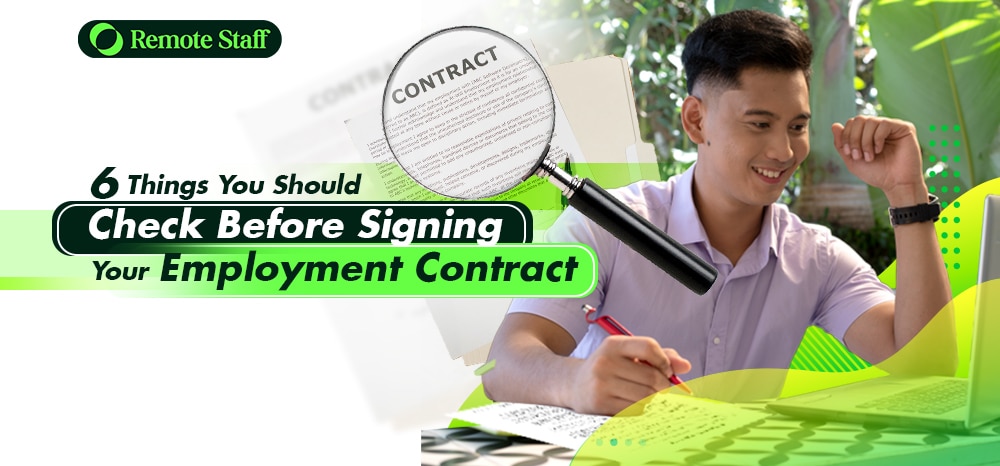So you finally landed an online job. Congratulations! You passed your job interview and finished submitting all your requirements. Now all that’s left to do is sign your employment contract…
But wait, there are some things you must check before you sign your employment contract.
A common mistake made by many applicants who just got a job is to sign their contracts immediately without bothering to read them. After all, it’s just a formality, right? And besides, it’s not even required in the Philippines.
But by not reading it, you risk accepting company policies you disagree with. Unscrupulous employers often hide these red flags within the employment contract so applicants won’t notice them. As they say: “The devil’s in the details.”
To avoid this, here are six things you should check in your employment contract before signing them.

What is an Employment Contract?
Before heading to this article’s main topic, let’s answer the key question first: What is an employment contract?
An employment contract is an agreement between an employer and employee covering the terms governing their working relationship.
There are three kinds of employment contracts: the written employment contract, implied employment contract, and union labor agreements.
Written employment contracts are what people usually think of when discussing employment contracts. These clearly define an employee’s role, responsibilities, and benefits.
An implied employment contract, on the other hand, is merely inferred from the comments made by your interviewer. Or, it could be included in your training manual or the employee handbook instead.
And finally, a union labor agreement is a group employment contract for members of labor unions. It contains the exact details as the previous two; while outlining the processes for addressing worker grievances should the agreement be violated.

Your Job Title and Duties.
One of the most essential things you should check before signing your employment contract is your title and role at work.
For example, let’s say you are hired as a virtual assistant at a company. When you receive your contract, check if the same title they indicated there matches the position you applied for. In addition, ensure that the responsibilities indicated are in line with your job title.
If there are significant differences between the job title and duties you applied for and what’s in the contract: call your employer’s attention immediately. If they can’t give you a straight answer as to why there are significant differences and/or refuse to amend accordingly, don’t sign the contract.

Your Salary.
When we first get our employment contracts, the section detailing our salaries and benefits is usually the first section we read. After all, we all want to know just how much we’ll get paid for doing our job.
When checking your salary, ensure that the amount indicated in the contract matches the one your interviewer agreed to. If it’s less than what you’ve negotiated, immediately bring it up with your employer.
Since you’ll be working remotely, check your company’s payment methods and salary payout schedules as well. In addition, if your employer promised you bonuses during the interview, ensure that these are stipulated in your contract as well.

Your Employee Benefits.
Besides your salary, you also have your employee benefits. These include your HMO plan, number of paid leaves, and bonuses you may receive, such as the thirteenth month pay.
If employee benefits were discussed during the interview, ensure that what they’ve promised you is included in the contract. For example, if you negotiated more paid leaves with your employer, these should be explicitly stated in your contract.
However, if you didn’t discuss your benefits during your interview, carefully read your employment contract and check the benefits you’ll receive. If you have any questions you want to ask your employer, ask them before signing the job contract.

When Does Your Employment Period Officially Start?
Of course, you shouldn’t forget to check when you’ll officially start working for your employer. Doing so helps you prepare, especially if you’re switching from one job to your current one.
Ensure you have ample time to tie up all loose ends on your previous job before shifting to your new one.
Afterwards, if you’re working full-time, check if your work hours at your new job match the one you’ve agreed to with your employer.

Who Your Direct Supervisor Will Be and/or Who Will You Supervise.
Of course, you also need to know the person you’ll be directly reporting to or the people you’ll be directly managing. Fortunately, their name/s and positions should be indicated in the contract.
Why is this important, you may ask? Knowing this will determine whether a co-worker exercising authority over you actually has the right to do so.
Besides, it’s a good idea to acquaint yourself with the person in charge of your performance review. You will spend most of your time working with them, after all.

Restrictive Covenants.
The last part of your employment contract is your restrictive covenants. Of course, you won’t have to worry about these at the start of your job, but it’s still great to be informed about them in advance.
Restrictive covenants are how companies protect their business, employees, and clients. These include noncompete agreements, non solicitation, confidentiality, and nondisclosure clauses.
These agreements stipulate an employee must never enter into competition of any form with their employer for a set period after their employment period. They also prevent employees from revealing company secrets to other parties during or after employment.
So if you leave a company that sells cars, you can’t immediately join a company that does the same or something similar for some time.

Remember, the Devil’s in the Details.
Reading through your employment contract is not a task many look forward to. Not only is it lengthy, but it also contains plenty of business jargon you may be unfamiliar with.
However, inspecting your contract well ensures that there will be no nasty surprises nor misunderstandings between you and your employer.
The 6 things mentioned above are the most essential ones you should check in your employment contract. Hopefully, you will find this helpful when starting your new job.
If you’re still looking for online jobs, head to Remote Staff. Our jobs list has various ones you can apply to, and it’s constantly updated with new ones everyday. Good luck!

